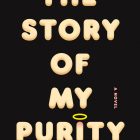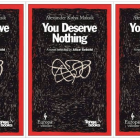Once More, With Feeling, Part II

Well, here we are again, and I’m sorry to say the blog has not been inundated with teachers explaining in great detail what they expect from their poetry writing seminars (looking at you, my people.) Nor have students written in saying what their own most cherished projected outcomes for such a course might be…though that’s pretty much my fault, because I didn’t ask. (I do ask in class, though. First day. Verbally and in writing. I swear.)
So I’m pretty much stuck with beginning where I ended last time: I’d just concluded that what I wanted my Students to Be Able to Do as a result of this fall’s poetry workshop—what I really, really wanted, more than heartfelt sentiment, or blazing genius, or even students who show their poetic natures by wearing lots of black and staying up all night—was to show that they could write, revise, and submit un-embarrassingly. What’s un-embarrassing? Definitions will of course vary—feel free to add your own—but in the interests of space, I’ll act like a demented poetic dictator and impose my own here: un-embarrassing is when we spell-check and proofread our cover letter and our poems, when our lines don’t make horrible retching sounds unintentionally, and when we know enough about what’s already out there that we don’t have to start from scratch or let other poets’ style devour ours half-digested. (“But why can’t I rhyme love with dove?” some young poets have been known to demand. The answers are legion and lengthy, but getting youthful poets there is one of the reasons to offer this course.) Un-embarrassing is when we callously strike down clichés which would, left to themselves, multiply in our work like tribbles (see, if that simile had contained the bunnies that first came to mind, that would have been embarrassing because of the cliché. As it is, the embarrassment is of another kind.) It’s when we keep good records and avoid simultaneously submitting anything accidentally, if that’s part of our professional ethic. (And if we decide that life is short, and simultaneously submit anyway, that should maybe be a conscious decision and be followed through, like any other, methodically.)
It’s at this point, having tentatively decided What We Want, that we lucky teachers get to decide How We’ll Know When We’ve Got It, the second half of the outcomes/assessment algebra. (After that, there are such lively considerations as instructional strategies, but as I keep telling Methods, let’s not get ahead of ourselves.) How will I know when young poets are capable of doing un-embarrassing? How can I check whether they’ve actually revised? And what measures assessing un-embarrassing-ness can present the illusion of validity, rather than resembling Justice Stewart’s famous obscenity definition?
Now “validity,” in the statistical sense in which it’s used by social scientists and authors of good surveys, is not really within my purview; as with many poets, my math is doing well if it keeps my checkbook balanced. But without ever aspiring to the heights of statistical analysis, we can still ask a few modest validity-related questions of our assessments:
- are they covering what I actually taught? (Half the test, or a high-stakes assignment, based on stuff that got half an hour of class time…bad news.)
- Are they free of tricks and traps and misleading questions? (Assessments designed to increase the failure rate…also, at least in my opinion, pedagogically problematic.)
- Do they have enough questions or aspects to them to fairly assess student knowledge or skills? This was a tough one for me, because I’m seldom really sure how many equals enough: but enough people pointed out that a single error on my five-question reading quizzes took off twenty percent to convince me, eventually, to raise the number of questions to ten. There was much wailing and gnashing from students—a longer quiz?—and some from me as well—more of my precious class time spent on assessment? But ultimately it seemed for the good of the students to do it that way, because I could assess more knowledge while they simultaneously stood a better chance of showing what they knew and doing well on the assessment. And most students grasped that pretty quickly.
- Have I made my expectations clear? Word of the day: rubric! Website of the day, at least for those who find rubric-building a constant struggle with MS Word’s gruesome table functions: Rubistar! It’s not, mind you, that I really adore Rubistar: it has no rubric for writing a poem, and if it had, based on its existing rubrics for creating a painting or (I kid you not) writing a musical, I’m pretty sure they’d be full of suspect categories like “effort” (count the beads of sweat?) and “originality” (as judged by…whom? What does “original” mean in a four-year-old, or a twenty-year-old? Almost certainly the psychologists have a good measure, but for people like me, who don’t, it’s better to just stay clear.) I have yet to create a rubric using this site without beating it to a pulp and re-forming it like papier-mâché . But it’s at least a starting point, for any of you wondering how on earth one can apply a rubric to a work of art. Which leads us to…
- …do those expectations relate to things students can do, or be taught to do, rather than to immeasurables like inspiration, sincerity, genius, and such? I know this sounds like a hypocritical consideration when I’ve made “embarrassment,” or lack of it, such a foundation of my objectives…but actually the non-embarrassing is eerily quantifiable. Because if I can’t judge students on genius, inspiration, originality, effort, sincerity, or talent (and I really can’t, for all the reasons I’ve been talking about), then what’s left is a series of dry-sounding but profoundly assessable qualities like…completion (an excellent substitute for the immeasurable pitfall of “effort.”) Compliance, a.k.a. following directions. Having actually read the assigned work (as assessed by use-your-notes just-the-facts reading quizzes and some objective questions on the exams.)
I do know how all this sounds: like I want budding poets to abandon wildness and wet, stop following their ears and livers, and toe some arbitrary line of mine. But if the guidelines for all that completion and compliance are sufficiently broad, and if there’s choice at every step of the way, there’s plenty of room for wild spontaneity to flourish within their parameters.
Consider: if I asked you to write a poem of at least five lines containing at least one metaphor and no clichés, and used a three-bar two-column rubric to assess it…did you? The answers to that are pretty well yes or no; no reference to genius, sincerity, originality and so on is needed; and there are no stipulations as to subject matter, how much longer than five lines you choose to go on, what else you put in besides one metaphor. And I can assess your ability to apply metaphor and avoid cliché fairly easily, while still allowing endless options. If I asked you to take one of your poems and substantially revise it in at least ONE of the ways offered on a certain handout, did you? Again, not a hard call, not the kind which leads to grade appeal hearings. Again, too, the poem can be any of your poems; it can be about anything; you’ve got a page (in ten point font) full of options with which to substantively revise; and no one’s going to make you declare this revision the final one, if you just can’t stand it and want to go back to the original.
Add all this to the time constraints I mentioned in Part I, and I think we’re looking at
- keeping the reading quizzes (on the premise that it’s hard to have a discussion if half the class hasn’t read, and that even great students can sometimes use a little incentive, like an easy A on a use-your-notes reading quiz.) These cover poems I’ve assigned, but also chapters on sonics, form, revision, various genres of poetry. They address things which are knowable, the ground on which we base our varying degrees of spontaneity and creativity.
- a series of smaller writing assignments, poems, with revisions due by specified dates (stuff coming in at the end of the semester in a great gush is a definite problem, and one to which, if I may generalize, poets are particularly prone.) Compliance here (did you write fourteen lines in iambic pentameter?) can be balanced with choice, both of assignments (each one offers some choices, so as not to back anybody into a corner) and within particular parameters.
- more professionalism questions on the exams (because exams bracket a semester so nicely, and can tell me so much about what students understand about the technical aspects of poetry) but maybe no longer the increasingly outdated hard-copy submission packet, with its Luddite stamp requirement. Exams: they can, and do, re-cover the objective ground, but they also include multiple modes and an array of choices. There’s seldom only one way for students to demonstrate what they know.
- maybe a little time spent on discussing, and a commensurate assignment assessing, proofreading, as a fair indicator of professionalism even in the digital age. Maybe a cover letter assignment, which’ll assess understanding of business letter format as well as of appropriate tone for the submission context.
- maybe reducing the final portfolio to a reflective letter or essay, with salient quotes from the author’s poems rather than a semester’s worth (or, in the less fortunate cases, a night’s worth) of perhaps unrevised poetry.
Thoughts? Doubts? Would these assignments really address my outcomes? Would they get me out of the judging-your-talent snare? Will I know when I’ve gotten what I want?
This is Catherine’s fourteenth post as a Guest Blogger.



